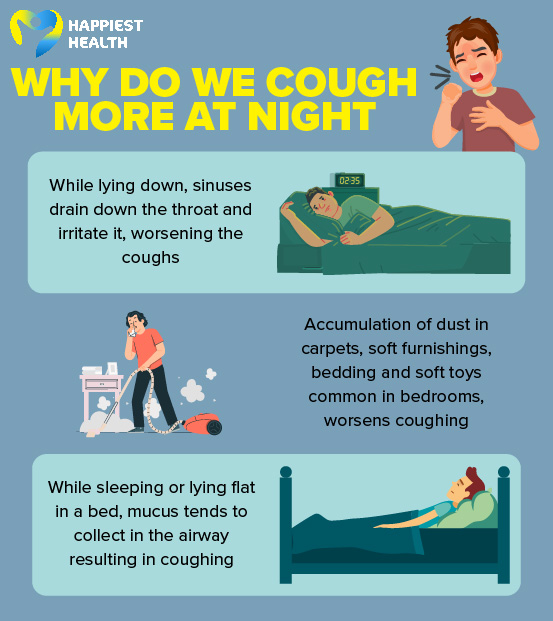
A child suffering from a bout of cough, especially at night can be worrisome for parents. Many parents ask the doctors for a cough relief medicine like a cough syrup. However, are cough syrups helpful in relieving the cough? Happiest Health spoke to experts who opine that without treating the underlying issue, cough syrups won’t help, as cough is only a symptom.
Why do we cough
Coughing is a reflexive defence mechanism of the body to expel an irritant out of the body. A cough thus needs to be suppressed only when it is distressing, according to Dr Akashdeep Singh Arora, pulmonologist, Healthway Hospital, Old Goa.
There are two types of coughs- dry and wet cough. A dry cough indicates an upper respiratory tract infection whereas a wet cough, that is usually accompanied with common cold or flu, indicates a lower respiratory tract infection according to guidelines published by the Indian Association of Pediatrics. Cough is also a symptom of allergic conditions like asthma.
It further states, “Cough is a symptom and not a disease. Antibiotics are needed only in case of infections such as bacterial pharyngitis, pneumonia and tuberculosis. Otherwise, most diseases presenting with cough need only symptomatic and supportive therapy, in the form of prescribed over-the-counter (OTC) cough medicines.”

There are also neurogenic coughs caused due to neurological conditions (nerves in the throat become overly sensitive) and not a respiratory tract infection, adds Dr Arora.
Is cough syrup bad for you: how do cough medicines work
Cough syrups are multi-ingredient products whose mode of action depends on its active ingredient. “It provides symptomatic relief but does not treat the underlying cause,” says Dr Gopal Wasgaonkar, pediatrician, Aster Aadhar Hospital, Kolhapur.
“They are broadly divided into cough suppressants and cough expectorants. Cough suppressants suppress cough by inhibiting cough reflex and are used for dry cough relief. Cough expectorants dilate the bronchi to easily clear the secretions through cough and are used for wet cough,” says Dr Manisha Mendiratta, pulmonologist, Sarvodaya Hospitals, Faridabad.
“The concentration of active ingredients in cough medicines for kids is lesser than the ones for adults. Inadequate or higher dosage is harmful for children as it can lead to conditions like increased heart palpitations, drowsiness and dryness of mouth,” mentions Dr Wasgaonkar.
Dr Mendiratta adds that the main drawback of cough syrups is sedation. “Most cough syrups contain dextromethorphan, a sedative drug that can cause decreased alertness, drowsiness, vertigo, and difficulty in maintaining gait. They can also become addictive. Therefore, the dose for such cough syrups should be taken only as prescribed by a doctor,” explains Dr Mendiratta.
Why cough medicine can be harmful to kids
“When compared to adults, children tend to cough more. This can be either due to smaller airways which can be easily obstructed or due to their stronger cough reflex,” says Dr Vikas Satwik, pediatrician, Motherhood Hospitals, Bengaluru.
Cough syrups can become harmful to kids if parents indiscriminately use it to treat their child’s cough without knowing what is causing it, says Dr Arora.
Some cough medicines contain antihistamines which may cause agitation or excitement instead of drowsiness among children, says Dr Satwik.
“Cough and cold medicines might have suppressants that are strictly prohibited for children, as they can result in side effects like slowed breathing, which can be life-threatening,” explains Dr Satwik.
When is it safe for kids to have cough medicine
Dr Satwik advises parents to not give cough syrups or any kind of product containing cough suppressant or decongestants to children under two years of age as it poses fatal side effects like convulsions, rapid heart rates, especially for infants.
“Studies indicate that children who are seven years and older can use cough medicine for kids. But it should be taken according to the specified dose prescribed from a general practitioner,” says Dr Satwik.
Alternatives to treat cough in kids
According to Dr Satwik, besides cough syrups, parents can choose the following alternatives to cough syrups:
- Drinking warm fluids: Fluids like caffeine-free tea, broth or hot water with lemon helps loosen up the mucus and soothe a sore throat.
- Using a humidifier: Humidifier helps ease a child’s breathing as dry air worsens a child’s cough.
- Encourage steaming: For older children, breathing in warm water vapours helps loosen mucus and provide comfort before sleeping.
- A spoonful of honey: Giving a teaspoon of honey helps combat coughing. However, honey should only be given to children over the age of one.
- Ginger and honey: Ginger and honey can be combined into a paste and given to kids as a natural remedy.
Takeaways
- A cough is a defence mechanism to expel a foreign irritant out of the body.
- Different cough medicines are used to provide symptomatic relief for dry coughs and wet coughs. However, they do not treat the underlying condition causing the cough.
- Consuming cough syrups can be detrimental to small children under the age of two as it can pose fatal side effects.
- Parents can choose alternatives like steaming or sipping warm fluids to bring relief to their kids’ cough.















